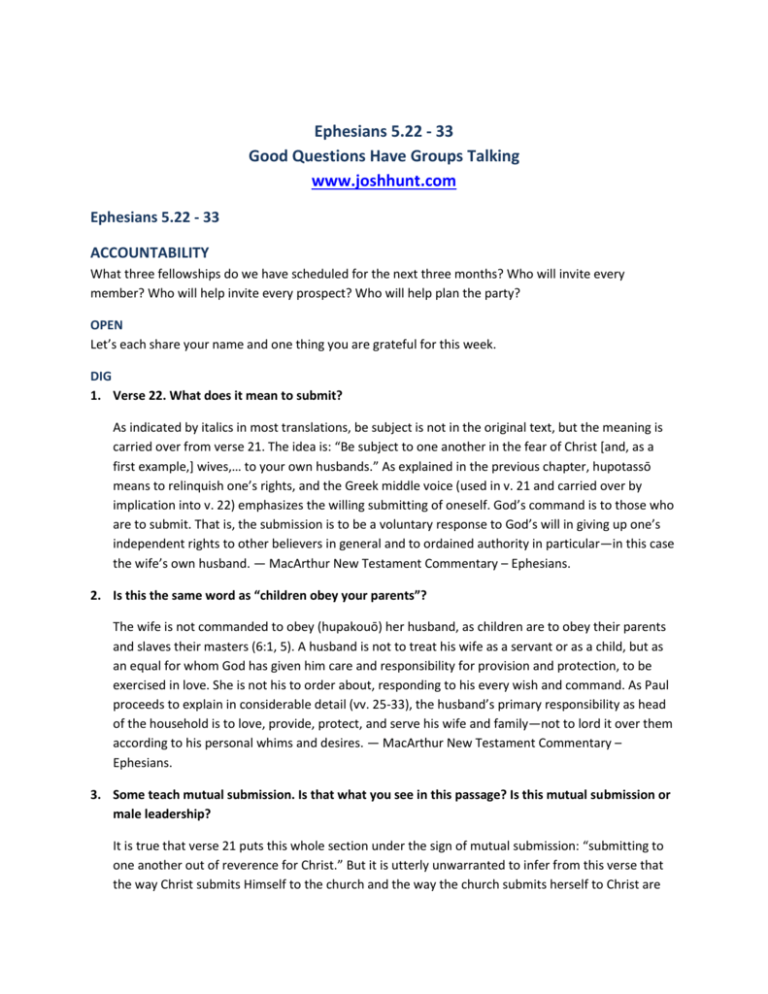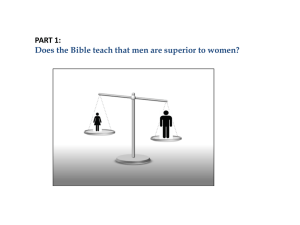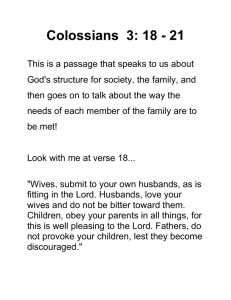Ephesians2010-5c - Bible Study Lessons | Adult Sunday School
advertisement

Ephesians 5.22 - 33 Good Questions Have Groups Talking www.joshhunt.com Ephesians 5.22 - 33 ACCOUNTABILITY What three fellowships do we have scheduled for the next three months? Who will invite every member? Who will help invite every prospect? Who will help plan the party? OPEN Let’s each share your name and one thing you are grateful for this week. DIG 1. Verse 22. What does it mean to submit? As indicated by italics in most translations, be subject is not in the original text, but the meaning is carried over from verse 21. The idea is: “Be subject to one another in the fear of Christ [and, as a first example,] wives,… to your own husbands.” As explained in the previous chapter, hupotassō means to relinquish one’s rights, and the Greek middle voice (used in v. 21 and carried over by implication into v. 22) emphasizes the willing submitting of oneself. God’s command is to those who are to submit. That is, the submission is to be a voluntary response to God’s will in giving up one’s independent rights to other believers in general and to ordained authority in particular—in this case the wife’s own husband. — MacArthur New Testament Commentary – Ephesians. 2. Is this the same word as “children obey your parents”? The wife is not commanded to obey (hupakouō) her husband, as children are to obey their parents and slaves their masters (6:1, 5). A husband is not to treat his wife as a servant or as a child, but as an equal for whom God has given him care and responsibility for provision and protection, to be exercised in love. She is not his to order about, responding to his every wish and command. As Paul proceeds to explain in considerable detail (vv. 25-33), the husband’s primary responsibility as head of the household is to love, provide, protect, and serve his wife and family—not to lord it over them according to his personal whims and desires. — MacArthur New Testament Commentary – Ephesians. 3. Some teach mutual submission. Is that what you see in this passage? Is this mutual submission or male leadership? It is true that verse 21 puts this whole section under the sign of mutual submission: “submitting to one another out of reverence for Christ.” But it is utterly unwarranted to infer from this verse that the way Christ submits Himself to the church and the way the church submits herself to Christ are the same. The church submits to Christ by a disposition to follow His leadership. Christ submits to the church by a disposition to exercise His leadership in humble service to the church. When Christ said, “Let the leader become as one who serves,” He did not mean let the leader cease to be a leader. Even while He was on His knees washing their feet, no one doubted who the leader was. Nor should any Christian husband shirk his responsibility under God to provide moral vision and spiritual leadership as the humble servant of his wife and family. I address the men directly for a moment: Do not let the rhetoric of unbiblical feminism cow you into thinking that Christlike leadership from husbands is bad. It is what our homes need more than anything. For all your meekness and all your servanthood and all your submission to your wife’s deep desires and needs, you are still the head, the leader. What I mean is this: You should feel the greater responsibility to take the lead in the things of the Spirit; you should lead the family in a life of prayer, in the study of God’s Word, and in worship; you should lead in giving the family a vision of its meaning and mission; you should take the lead in shaping the moral fabric of the home and in governing its happy peace. I have never met a woman who chafes under such Christlike leadership. But I know of too many wives who are unhappy because their husbands have abdicated their God-ordained leadership and have no moral vision, no spiritual conception of what a family is for, and therefore no desire to lead anyone anywhere. A famous cigarette billboard pictures a curly-headed, bronze-faced, muscular macho with a cigarette hanging out the side of his mouth. The sign says, “Where a man belongs.” That is a lie. Where a man belongs is at the bedside of his children, leading in devotion and prayer. Where a man belongs is leading his family to the house of God. Where a man belongs is up early and alone with God seeking vision and direction for his family. — Desiring God: Meditations of a Christian Hedonist. 4. What does the word head mean in this context? kephalē also refers to the phenomenon of “headship,” from both a human and divine perspective. Within the sphere of the family, for example, 1 Cor. 11:3 speaks of a fundamental divine ordering: the head of man is Christ; the head of woman is man, and the head of Christ is God (cf. Eph. 5:23). 1 Cor. 11:5, 10 maintains that a woman uncovering her head amounts to a dishonoring of her head, violating her symbolic submission to both her husband and to Christ. The argument is also adduced (1 Cor. 11:7) that because the man is “then head of his wife” and made in the image of God, his head is not to be covered. The term kephalē here is used symbolically to refer not to respective values of man and woman in the sight of God, but rather to their relative functions in the divinely ordered sphere of family and worship. kephalē also conveys a divine perspective on headship. For example, reference to Jesus Christ as the chief cornerstone, the one rejected by the builder, is interpreted by the gospel writers as a fulfillment of the Old Testament prophecy in Ps. 18:22 (cf. Matt. 21:42; Mark 12:10; Luke 20:17). References to Christ as head of the church are found in Eph. 1:22; 4:15; 5:23; Col. 1:18; 2:19. In addition, Christ is depicted as the head of all rulers in the kingdom of God, the supreme figure of universal authority (cf. Col. 2:10). — Expository Dictionary of Bible Words: Word Studies for Key English Bible Words Based on the Hebrew and Greek Texts. 5. How are husbands to love their wives? If the husband makes Christ’s love for the church the pattern for loving his wife, then he will love her sacrificially (Eph. 5:25). Christ gave Himself for the church; so the husband, in love, gives himself for his wife. Jacob so loved Rachel that he sacrificially worked fourteen years to win her. True Christian love “seeketh not her own” (1 Cor. 13:5)—it is not selfish. If a husband is submitted to Christ and filled with the Spirit, his sacrificial love will willingly pay a price that she might be able to serve Christ in the home and glorify Him. — The Bible Exposition Commentary – New Testament, Volume 2. 6. Who do you think has the more difficult command—men to love their wives as Christ loved the church, or women to submit to their husbands? Percentage of American adults who disagree with the statement: “A wife should submit graciously to the servant leadership of her husband”: 69 Disagreement declines slightly (to six in 10) when survey respondents are reminded that the statement is taken from the Bible. — Citation: Emerging Trends (April 1999); based on a Gallup Poll, conducted June 22-23, 1998, of 1,016 adults / Illustrations for Every Topic and Occasion - – Perfect Illustrations: For Every Topic and Occasion. 7. What does it take for a marriage to grow gradually better over the years? MARRIAGES BEGIN WARM AND INTIMATE but over time they can become cold and businesslike. Consider the seven ages of a marriage cold. The first year the husband says, “Sugar, I’m worried about my little baby girl. You’ve got a bad sniffle. I want to put you in the hospital for a complete checkup. I know the food is lousy, but I’ve arranged for your meals to be sent up from Rossini’s. It’s all arranged.” The second year: “Listen, honey, I don’t like the sound of that cough. I’ve called Dr. Miller and he’s going to rush right over. Now will you go to bed like a good girl just for me, please?” The third year: “Maybe you’d better lie down, honey. Nothing like a little rest if you’re feeling bad. I’ll bring you something to eat. Have we got any soup in the house?” The fourth year: “Look, dear. Be sensible. After you’ve fed the kids and washed the dishes you’d better hit the sack.” The fifth year: “Why don’t you take a couple of aspirin?” The sixth year: “If you’d just gargle or something, instead of sitting around barking like a seal.” The seventh year: “For heaven’s sake, stop sneezing. What are you trying to do, give me pneumonia?” -Bruce Larson, The One and Only You / Swindoll’s Ultimate Book of Illustrations & Quotes (Charles R. Swindoll) 8. What is God’s purpose(s) for marriage? God established marriage for many reasons. For one thing, it meets man’s emotional needs. “It is not good that the man should be alone” (Gen. 2:18). Marriage also has a social purpose in the bearing of children to continue the race (Gen. 1:28). Paul indicated a physical purpose for marriage—to help man and woman fulfill the normal desires given them by God (1 Cor. 7:1-3). But in Ephesians 5, Paul indicated also a spiritual purpose in marriage, as the husband and wife experience with each other the submission and the love of Christ (Eph. 5:22-33). — The Bible Exposition Commentary – New Testament, Volume 2. 9. What do we learn about God’s goal for our lives from verse 26? Today, Christ is cleansing His church through the ministry of His Word (John 15:3; 17:17). The love of the husband for his wife ought to be cleansing her (and him) so that both are becoming more like Christ. Even their physical relationship should be so controlled by God that it becomes a means of spiritual enrichment as well as personal enjoyment (1 Cor. 7:3-5). The husband is not to “use” his wife for his own pleasure, but rather is to show the kind of love that is mutually rewarding and sanctifying. The marriage experience is one of constant growth when Christ is the Lord of the home. Love always enlarges and enriches, while selfishness does just the opposite. — The Bible Exposition Commentary – New Testament, Volume 2. 10. Verse 26. Y.B.H. Yes, but how—how does God cleanse us? There has been much diversity of opinion respecting the meaning of this. Probably the sense of the expression is, that all this was to be accomplished by the instrumentality of the truth—the word of God. By that truth they were to be sanctified, John 17:17; and in accordance with that the whole work, from the commencement to the dose, was to be accomplished. It was not by external ceremonies, and not by any miraculous power on the heart, but by the faithful application of truth to the heart. — Notes on the New Testament Explanatory and Practical. 11. How does the world’s concept of love differ from God’s? The word love has been tossed around flippantly and reduced to its lowest common denominator today, to the point that many people don’t see any qualitative difference between the statements “I love yogurt” and “I love my wife.” That’s why we need to begin by reminding ourselves that the Bible’s definition of love is so much more than personal taste or preference, or even affection. The biblical concept of agape love involves giving of yourself for the benefit of another, even at your own expense. Biblical love means picking up the check in order to love someone else—and the Bible says this is the way a man ought to love his wife. By the way, biblical love is an act of the will and not just a fuzzy feeling in the stomach. That’s why God can command us to love one another. Love really has nothing to do with whether you feel loving at a particular moment. It has to do with the need of the person being loved, not the feelings of the one doing the loving. We’ll see later how this love applies to a marital relationship. — Tony Evans Speaks Out on a Man’s Role in the Home. 12. Verse 28. Does the Bible teach us to love ourselves? Greek mythology tells of a beautiful youth who loved no one until one day he saw his own reflection in the water and fell in love with that reflection. He was so lovesick that he finally wasted away and died and was turned into the flower that bears his name—Narcissus. We are revulsed by narcissism and carefully seek to avoid it. But here the Scriptures actually call us to a self-love: “In this same way, husbands ought to love their wives as their own bodies. He who loves his wife loves himself. After all, no one ever hated his own body, but he feeds and cares for it, just as Christ does the church - for we are members of his body” (Ephes. 5:28-30). The Golden Rule of Matrimony is, You shall love your wife as yourself (cf. Leviticus 19:18), and when you love her as yourself, you will be loving yourself because the two of you are one flesh. — Preaching the Word – Ephesians: The Mystery of the Body of Christ. 13. Verse 31. Why is it important that a man leave his father and mother? You can’t be loyal to both parents and your partner. You have to leave to cleave. 14. Who has a story of a time when you felt really loved by your spouse? Winston Churchill once attended a formal banquet in London at which the attending dignitaries were asked the question, “If you could not be who you are, who would you like to be?” Naturally everyone was curious as to what Churchill, seated next to his beloved Clemmie, would say. When it finally came Churchill’s turn, the old man, who was the dinner’s last respondent to the question, rose and gave his answer. “If I could not be who I am, I would most like to be” - here he paused to take his wife’s hand - “Lady Churchill’s second husband.” The old boy made some points that night. But his comments also apply to everyone who has a good marriage. — Preaching the Word – Ephesians: The Mystery of the Body of Christ. 15. Verse 33. Why do you think he gives different commands to husbands and wives? The major problem I heard from wives was, “He doesn’t love me.” Wives are made to love, want to love, and expect love. Many husbands fail to deliver. But as I kept studying Scripture and counseling couples, I finally saw the other half of the equation. Husbands weren’t saying it much, but they were thinking, She doesn’t respect me. Husbands are made to be respected, want respect, and expect respect. Many wives fail to deliver. The result is that five out of ten marriages land in divorce court (and that includes evangelical Christians). As I wrestled with the problem, I finally saw a connection: without love from him, she reacts without respect; without respect from her, he reacts without love. Around and around it goes. I call it the Crazy Cycle-marital craziness that has thousands of couples in its grip. — Love & Respect: The Love She Most Desires, the Respect He Desperately Needs (Emerson Eggerichs) 16. How can a wife respect her husband if he does not love her? How can a husband love his wife if he does not feel respected? “A husband is to obey the command to love even if his wife does not obey this command to respect, and a wife is to obey the command to respect even if the husband does not obey the command to love.” So far, so good. Then I reasoned further: “A husband is even called to love a disrespectful wife, and a wife is called to respect an unloving husband. There is no justification for a husband to say, `I will love my wife after she respects me’ nor for a wife to say, `I will respect my husband after he loves me.”‘ — Love & Respect: The Love She Most Desires, the Respect He Desperately Needs (Emerson Eggerichs) 17. Is this a suggestion or a command? How important is it that a wife respect her husband and a husband love her wife? In many cases, the wife’s dislike is interpreted by the husband as disrespect and even contempt. In his opinion, she has changed from being the admiring, ever-approving woman she was when they courted. Now she doesn’t approve, and she’s letting him know it. So the husband decides he will motivate his wife to become more respectful by acting in unloving ways. This usually proves about as successful as trying to sell a pickup to an Amish farmer. Even more convincing is what Ephesians 5:33 teaches about the woman’s primary need for love and the man’s primary need for respect: The husband must love his wife as he loves himself, and the wife must respect her husband. Could it be any clearer than that? Paul isn’t making suggestions; he is issuing commands from God Himself. In addition, the Greek word Paul uses for love in this verse is agape, meaning unconditional love. And the wording of the rest of the passage strongly suggests that the husband should receive unconditional respect. Christian spouses should not read this verse to say, “Husbands, love your wives unconditionally, and wives, respect your husbands only if they have earned and deserve it.” As the old saying goes, what is sauce for the goose is sauce for the gander. In this verse, respect for the husband is just as important as love for the wife. — Love & Respect: The Love She Most Desires, the Respect He Desperately Needs (Emerson Eggerichs) 18. If you could give one bit of advice to your son or daughter when they got married and you knew they would listen, what advice would you give? J. Allan Peterson, in The Myth of the Greener Grass, writes: Newspaper columnist and Minister George Crane tells of a wife who came into his office full of hatred toward her husband. “I do not only want to get rid of him; I want to get even. Before I divorce him, I want to hurt him as much as he has me.” Dr. Crane suggested an ingenious plan. “Go home and act as if you really loved your husband. Tell him how much he means to you. Praise him for every decent trait. Go out of your way to be as kind, considerate, and generous as possible. Spare no efforts to please him, to enjoy him. Make him believe you love him. After you’ve convinced him of your undying love and that you cannot live without him, then drop the bomb. Tell him that you’re getting a divorce. That will really hurt him.” With revenge in her eyes, she smiled and exclaimed, “Beautiful, beautiful. Will he ever be surprised!” And she did it with enthusiasm. Acting “as if.” For two months she showed love, kindness, listening, giving, reinforcing, sharing. When she didn’t return, Crane called. “Are you ready now to go through with the divorce?” “Divorce!” she exclaimed. “Never! I discovered I really do love him.” Her actions had changed her feelings. Motion resulted in emotion. The ability to love is established not so much by fervent promise as often repeated deeds. — 750 Engaging Illustrations. 19. What are some of the most common mistakes couples make in their marriages? What keeps couples from realizing their dreams? Here are some of the most common attitudes that indicate immaturity. D ETA C H MEN T. Have you ever been with someone who was physically present but a million miles away emotionally? His body was in the room, but his mind was elsewhere. This describes detachment, which is the tendency to disconnect from a relationship. The detached partner either distances himself mentally or focuses on something else, causing the other person in the relationship to feel alone and disconnected. Detachment is a sign of relational immaturity. Grownups need to have the ability to connect at deep and emotional levels with themselves and others. This is the basis of love itself. When you tend toward detachment, you are not mature and complete in the ability to love and connect fully. C 0 N T R 0 L. When one spouse resists the freedom of the other, the issue is control, which is also a type of immaturity. We are designed by God to control ourselves, not each other. Mature couples support and enjoy each other’s freedom and choices. However, an immature partner attempts to make her spouse do things her way, often by using intimidation, aggressiveness, manipulation, or guilt. Trying to control your partner is a dumb attitude that will sink your love life. When one partner feels that he has to choose what the other wants, he does not feel free. And people who are not free cannot love. Love grows only when it has the freedom to make wholehearted choices. IRRESPONSIBILITY. One sign of a mature marriage is that both spouses are responsible and faithful in the relationship. That is, they do what they promise. They take initiative to solve problems. When they make a mistake, they own up to it and make changes. Responsible spouses carry their end of the weight in the marriage. A partner who fails to own her part of the responsibility in marriage is demonstrating immaturity, like a Peter Pan who doesn’t want to grow up. She may be charming and loving yet undependable and unreliable. Irresponsibility is another sign that a spouse isn’t fully an adult yet. SELF-CENTERED NESS. Grownups should be able to step Out of their own point of view and enter the world of others’ feelings, values, experiences, and opinions. Maturity is when you can put yourself aside temporarily and feel what the other person is feeling. When a spouse does not readily engage at this level, it is generally the immaturity of selfcenteredness. (Sometimes it can also be detachment, but a detached person is more disconnected than self-absorbed.) — Rescue Your Love Life: Changing the 8 Dumb Attitudes & Behaviors That Will Sink Your Marriage (Dr. Henry Cloud and Dr. John Townsend) 20. What do you want to recall from today’s lesson? 21. How can we support one another in prayer?







